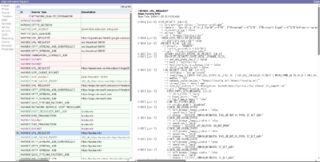Web標準でサポートされているため実装が非常に容易。特に理由がなければこれでいい
HTMLコード
<textarea onpaste="handlePasteForm(event)"></textarea>
JSコード
fetch()のヘッダ指定がないが、 fetch()を使う場合はFormDataを使うと勝手に生えるので気にしなくていい。他にもXMLHttpRequest.send()やNavigator.sendBeacon()でも生えるらしい。
今回試したEdgeではバウンダリー文字列もちゃんと生えていた。
/** @param {ClipboardEvent} e */
const handlePasteForm = (e) => {
if (e.clipboardData.files.length) {
const pasteFile = e.clipboardData.files[0];
const form = new FormData();
form.append('image', pasteFile);
fetch('./test.php', {
method: 'POST',
body: form
});
} else {
// 何もしない
}
};
PHPコード
Content-Typeがmultipart/form-dataの時だけ中身が入ってくる
参考:https://www.php.net/manual/ja/reserved.variables.files.php
<?php
$file_name = $_FILES['image']['name'];
move_uploaded_file($_FILES['image']['tmp_name'], './'. $file_name);
>
$_FILESの中身はvar_dumpした限りこんな感じだった
array(1) {
["image"]=>
array(6) {
["name"]=>
string(9) "image.png"
["full_path"]=>
string(9) "image.png"
["type"]=>
string(9) "image/png"
["tmp_name"]=>
string(29) "C:\env\msys64\tmp\php3B90.tmp"
["error"]=>
int(0)
["size"]=>
int(3988)
}
}
Web標準ではないので、これといったやり方もなく、正直面倒だが、どうしてもJSONで送らないといけないときに。
HTMLコード
<textarea onpaste="handlePasteJson(event)"></textarea>
JSコード
HTTPではバイナリを送ることができないため、Base64にエンコードして送る。Base64エンコードに含まれる情報はファイルバイナリのみ。もしFORM送信のようにファイル名も送りたければ、別途送ってやる必要がある。
/** @param {File} file */
const encodeBase64 = (file) => {
return new Promise ((resolve, reject) => {
const fr = new FileReader();
fr.onload = () => {
const data = fr.result.split(',')[1];
resolve(fr.result.split(',')[1]);
};
fr.onerror = (ev) => {
reject(ev);
};
fr.readAsDataURL(file);
});
};
/** @param {ClipboardEvent} e */
const handlePasteJson = async (e) => {
if (e.clipboardData.files.length) {
const pasteFile = e.clipboardData.files[0];
const base64File = await encodeBase64(pasteFile);
fetch('./test.php', {
method: 'POST',
headers: {
'content-type': 'application/json'
},
body: JSON.stringify({ image: base64File })
});
} else {
// 何もしない
}
};
PHPコード
JSONリクエストを取るときはfile_get_contents('php://input')を利用する。$_POSTはContent-Typeがapplication/x-www-form-urlencodedないしmultipart/form-dataの時しか取れないからだ。つまりFORMリクエスト以外はfile_get_contents('php://input')で取ると覚えておけばよいだろう。
参考:https://www.php.net/manual/ja/wrappers.php.php#wrappers.php.input
以下のコードはかなりいい加減なので余りアテにしてはいけない(特に拡張子取得の下りがガバガバすぎる)が、取り合えずpngかjpegかgifが送られてきた場合は動いてくれる筈だ。
<?php
// 連想配列にするため、json_decode()の第二引数をtrueにする(指定しないとstdClassになる
$json = json_decode(file_get_contents('php://input'), true);
// Base64エンコードを解除する
$file = base64_decode($json['image']);
// 一時ファイルに落とす
file_put_contents('json_upload', $file);
// 拡張子判別
$mime = mime_content_type('json_upload');
// 拡張子取得
$ext = explode('/', $mime);
// 拡張子付きにリネーム
rename('json_upload', 'image.'. $ext[1]);
参考
JSONでファイルを投げる方式での実装状況については以下の記事が参考になる。
WebAPI でファイルをアップロードする方法アレコレ #API - Qiita
今までの実装が全部動かせるサンプル
<?php
if ($_SERVER['REQUEST_METHOD'] === 'POST') {
if(preg_match('/^multipart\/form-data;/', $_SERVER['CONTENT_TYPE'])) {
// form
$file_name = $_FILES['image']['name'];
move_uploaded_file($_FILES['image']['tmp_name'], './'. $file_name);
} else {
// json
$json = json_decode(file_get_contents('php://input'), true);
$file = base64_decode($json['image']);
file_put_contents('json_upload', $file);
$mime = mime_content_type('json_upload');
$ext = explode('/', $mime);
rename('json_upload', 'image.'. $ext[1]);
}
} else {
?>
<!DOCTYPE html>
<html>
<head>
<meta charset='utf-8'>
<meta http-equiv='X-UA-Compatible' content='IE=edge'>
<title>Upload test</title>
<meta name='viewport' content='width=device-width, initial-scale=1'>
<script>
/** @param {File} file */
const encodeBase64 = (file) => {
return new Promise ((resolve, reject) => {
const fr = new FileReader();
fr.onload = () => {
const data = fr.result.split(',')[1];
resolve(fr.result.split(',')[1]);
};
fr.onerror = (ev) => {
reject(ev);
};
fr.readAsDataURL(file);
});
};
/** @param {ClipboardEvent} e */
const handlePasteForm = (e) => {
if (e.clipboardData.files.length) {
const pasteFile = e.clipboardData.files[0];
const form = new FormData();
form.append('image', pasteFile);
fetch('./test.php', {
method: 'POST',
body: form
});
} else {
// 何もしない
}
};
/** @param {ClipboardEvent} e */
const handlePasteJson = async (e) => {
if (e.clipboardData.files.length) {
const pasteFile = e.clipboardData.files[0];
const base64File = await encodeBase64(pasteFile);
fetch('./test.php', {
method: 'POST',
headers: {
'content-type': 'application/json'
},
body: JSON.stringify({ image: base64File })
});
} else {
// 何もしない
}
};
</script>
</head>
<body>
<div>Form:<textarea onpaste="handlePasteForm(event)"></textarea></div>
<div>Json:<textarea onpaste="handlePasteJson(event)"></textarea></div>
</body>
</html>
<?php
}
?>
